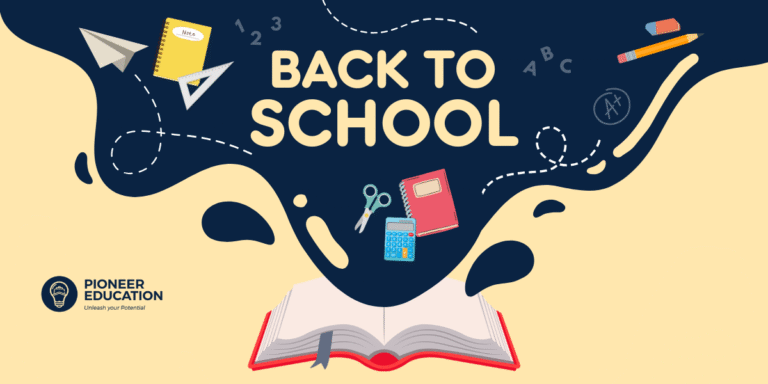From Year 7 to Year 8: Building Strong Habits for Success
Introduction
The jump from Year 6 to Year 7 is often marked by nerves and novelty: new teachers, bigger schools, multiple classrooms, and higher expectations. But just when your child has finally found their footing in Year 7, it’s already time to prepare for Year 8 — a year that builds on foundational skills while demanding even greater independence.
At Pioneer Education, we work with hundreds of students across this transition and know how vital it is to keep up momentum. Year 8 often determines whether a student continues with confidence or starts to fall behind. This blog shares key tips to help students move from Year 7 into Year 8 smoothly, stay academically strong, and grow into self-driven learners.
- Reflect on Year 7: What Worked & What Didn’t
Before rushing into new goals, it’s essential to pause and reflect on the year that’s just passed.
Encourage reflection on three core areas:
- Academic strengths and gaps: Which subjects did they enjoy or struggle with?
- Study habits: Did their study sessions feel effective, or were they mostly last-minute?
- Organisation: Were assignments turned in on time? Was their school bag a disaster or well-managed?
Ask your child questions like:
- What are you proud of from this year?
- What do you wish you had done differently?
- What’s one new habit you want to try next year?
Helping students think critically about their Year 7 experience sets the foundation for a more intentional Year 8.
- Strengthen Core Subjects — Especially English & Maths
Year 8 content builds heavily on Year 7 foundations, especially in core subjects like Maths and English.
Why it matters:
- Gaps in algebra or number operations will snowball in Year 8.
- English becomes more analytical — strong writing, vocabulary, and reading skills are essential.
What you can do:
- Review report cards and assessment feedback to identify topics that need work.
- Over the holidays, revisit key Year 7 concepts using resources or tutoring support.
- Attend a structured summer program like ours at Pioneer Education that targets the transition between Year 7 and Year 8.
Remember: it’s not about “getting ahead” — it’s about strengthening the base to handle new material with ease.
- Upgrade Study Habits for More Demanding Work
As students progress to Year 8, the academic load increases, and teachers expect more independence.
Common issues we see in Year 8 students:
- Still relying on memory instead of structured note-taking.
- Leaving assignments to the night before.
- Studying without clear goals or time limits.
How to upgrade habits:
- Teach the “Pomodoro” method: study in 25-minute focused sessions with 5-minute breaks.
- Help them set up a weekly planner to visualise schoolwork, sports, and study time.
- Encourage active learning (summarising, teaching the concept back) over passive reading.
At Pioneer Education, we incorporate study-skills coaching into our classes so students build habits that scale into higher years.
- Boost Confidence with Early Wins
Many students enter Year 8 feeling unsure about whether they can handle more advanced work. This is the perfect time to build confidence through early academic wins.
Strategies:
- Set realistic goals for Term 1 — e.g., improve maths test score by 10%, write one full English essay per month at home.
- Offer support early — rather than waiting for signs of struggle in Term 2.
- Celebrate small improvements and effort, not just results.
With encouragement and a few early victories, students begin to believe in their own ability to improve — and motivation skyrockets.
- Strengthen Social Skills & Emotional Resilience
The emotional and social shifts between Year 7 and 8 are just as important as academic changes.
What to watch for:
- Friendships shifting — or feelings of exclusion.
- Comparisons with peers leading to confidence drops.
- Greater emotional highs and lows as students navigate adolescence.
How parents can help:
- Keep open communication without judgment. Ask daily, “What was one good and one challenging thing today?”
- Teach emotional vocabulary so they can explain how they feel.
- Encourage healthy habits (sleep, exercise, screen limits) which greatly affect emotional regulation.
We believe academic and emotional growth go hand in hand. That’s why Pioneer Education tutors provide mentorship alongside tutoring — offering encouragement, listening, and guidance.
- Build Independence — But Don’t Disappear
By Year 8, students should be practising more independence — but they still need scaffolding.
Let them manage…
- Homework schedules.
- Keeping track of due dates.
- Packing bags, managing materials.
But support them with…
- Check-ins (“What’s your plan for the week?” instead of “Do your homework now.”)
- Conversations about choices and consequences.
- Tutoring that empowers rather than handholds.
The goal is to help students learn to self-manage before Year 9 and 10, when demands increase again.
Conclusion: Help Your Child Enter Year 8 Strong
Year 8 doesn’t have to be a struggle. With reflection, skill-building, and support, students can enter the new school year with confidence, capability, and a love for learning.
At Pioneer Education, we work with students not just to improve marks, but to develop academic habits, emotional resilience, and long-term motivation. Whether your child needs help catching up, staying ahead, or just building better habits — we’re here to support their journey every step of the way.
Interested in setting your child up for Year 8 success?
Book a free trial class with Pioneer Education and see how we can make a difference. Let’s build strong students — together.







